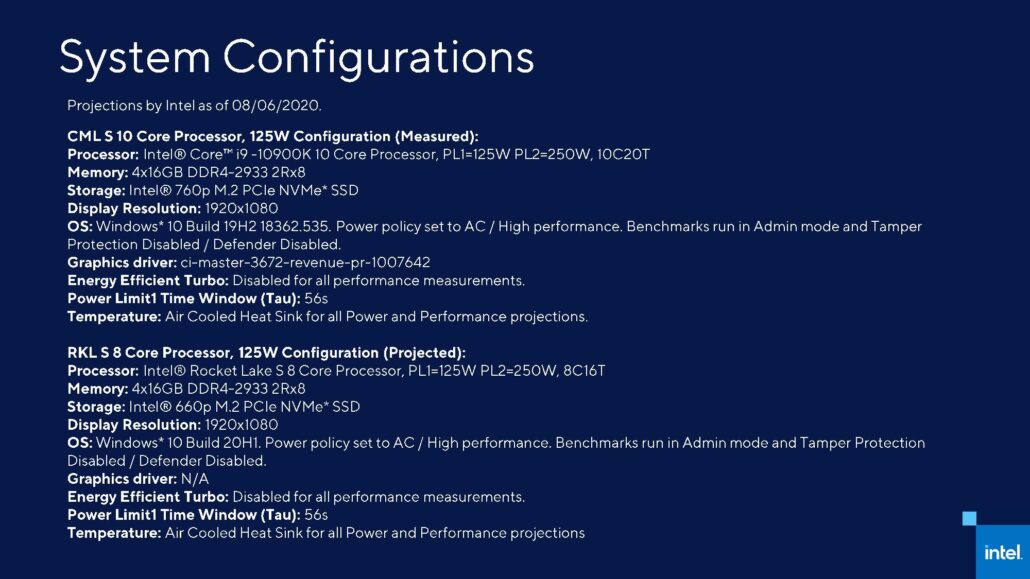
Intel has decided to reveal some additional details about its upcoming Rocket Lake processors and one of the major differences between leaks and reality is the fact that it actually features Cypress Cove cores – based on Ice Lake – instead of Willow Cove.
Intel Rocket Lake landing in Q1 2021, features Cypress Cove cores, PCIe 4.0 and double-digit IPC increase over Skylake
Intel’s Rocket Lake processors will have up to 8 cores and feature 50% more integrated graphics power. RKL-S is based on the 14nm process, but unlike older generations, it will feature a revamped architecture based on the Sunny Cove (Ice Lake) architecture called Cypress Cove. It is essentially a backport of 10nm (non-SuperFin) to 14nm. PCIe 4.0 support and Xe 12 generation graphics have been added as well.
Since it is based on the 14nm process, leaked benchmarks indicates that it will be able to boost up to 5.0 GHz (which is typical for the highly mature process right now) allowing for a best of both worlds situation where a new architecture is able to hit the ground running (speaking from a clock speed perspective) because of the highly mature node.
Rocket Lake S will feature 20 CPU based PCIe 4.0 lanes (4 more than last generation) making it the first mainstream Intel architecture to support the PCIe 4.0 standard and something that has been sorely lacking from the company’s lineup right now. It features new Deep Learning Boost and VNNI support which should give a significant speedup to AI-related workflows. It also features the new USB 3.2 Gen 2×2 standard for blazing-fast USB speeds and has Intel’s 12th generation Xe graphics iGPU – which is nothing to sneeze at. Xe Graphics introduces support for high end video decoders like 4:4:4 HEVC and VP9 while allowing display resolutions of up to 3x 4k60. The integrated memory controller now natively supports speeds of up to DDR4-3200 without any overclocking.
This is great news for enthusiasts because RKL is going to be the first major new architecture in a very long time. However, the fact that it is based on Cypress Cove instead of Willow Cove likely means that we will not see the 25%+ IPC we were expecting although Intel has already confirmed that it *will* be double digits. A 5.0 GHz boost clock combined with a major new architecture should offer the best possible combination for a performance upgrade for Intel customers (although at the cost of similar TDP) in a very long time and I am personally really excited to see how this performs.

The full press release is given below:
What’s New: Earlier this year, Intel made desktop PCs even better with 10th Gen Intel® Core™ S-series processors, headlined by the Intel Core i9-10900K. In the first quarter of 2021, the 11th Gen Intel Core S-series desktop processors (code-named Rocket Lake-S) will bring even more performance to gamers and PC enthusiasts.
Intelligently designed for desktop performance, Rocket Lake takes advantage of the microarchitecture changes and IPC advancements to deliver improved raw performance, gen over gen.
About the Architecture: The 11th Gen Intel Core S-series desktop processor will introduce a new desktop architecture, called Cypress Cove, designed to transform hardware and software efficiency and increase performance. This will enable double-digit percentage IPC performance improvement (gen over gen) and deliver enhanced Intel® UHD™ graphics featuring the Intel® Xe Graphics architecture.
Why Frequency and IPC (Instructions Per Clock) Matter: Games and most applications continue to depend on high-frequency cores to drive high frame rates and lower latency. In addition, the number of instructions per clock (IPC) improve on the performance that frequency delivers by executing more instructions. Intel continues to push the limits of performance with IPC gains and the frequencies necessary for gaming, content creation and multitasking.
Optimized for Amazing Gaming: Some of the new features being introduced with 11th Gen Intel Core S-Series include:
- New Cypress Cove architecture featuring Ice Lake Core architecture and Tiger Lake Graphics architecture.
- Double-digit percentage IPC performance improvement.
- Better gen-over-gen performance.
- Up to 20 CPU PCIe 4.0 lanes for more configuration flexibility.
- Enhanced Intel UHD graphics featuring Intel Xe Graphics architecture.
- Intel® Quick Sync Video, offering better video transcoding and hardware acceleration for latest codecs.
- New overclocking features for more flexible tuning performance.
- Intel® Deep Learning Boost and VNNI support.